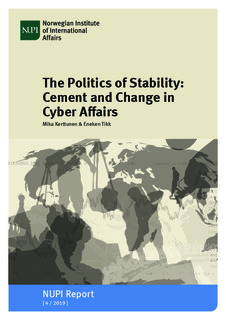The Politics of Stability: Cement and Change in Cyber Affairs
Research report
Published version
Permanent lenke
http://hdl.handle.net/11250/2598287Utgivelsesdato
2019Metadata
Vis full innførselSamlinger
- NUPI Report [196]
- Publikasjoner fra Cristin - NUPI [1429]
Sammendrag
Stability is a delicate attribute of public international order. If pursued to its absolute, it could paralyse the development and progress of humankind. If marginalized, it could fuel injustice, violence and conflict. Several differing concepts of ‘stability’ can be identified in international affairs. The United Nations Security Council uses the term to express a desirable state of affairs, almost synonymous with the concept of ‘peace’. In a 1992 ‘Note by the President of the Security Council’, various sources of instability were seen as threatening peace and security. The Council recognized that otherwise welcomed political changes may bring new risks to stability and security, especially stemming from changes to state structures. As the Council observed, ‘non-military sources of instability in the economic, social, humanitarian and ecological fields’ had become threats to peace and security.1 Similarly, in 2005 the Council discussed the food crisis in Africa as a threat to peace, security and stability The Politics of Stability: Cement and Change in Cyber Affairs

